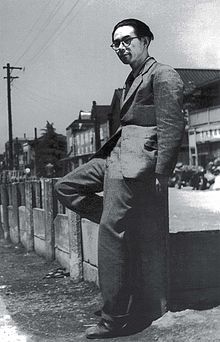Hara Tamiki
Hara Tamiki ( Japanese 原 民 喜 ; born November 15, 1905 in Hiroshima ; † March 13, 1951 ) was a Japanese writer.
Life
Hara attended Hiroshima Middle School until 1923. From the age of twelve he kept a diary and wrote poetry. At an early age he read the works of the great Russian writers of the 19th century ( Nikolai Gogol , Anton Chekhov , Fyodor Dostoyevsky , Leo Tolstoy , Ivan Turgenev ), as well as the Bible and the poems of Walt Whitman and Rainer Maria Rilke .
From 1923 he lived completely withdrawn in Tokyo and wrote short stories and fairy tales. He only had contact with the outside world through his wife Sadae. After the death of his wife in 1944, he fled the bombing raids on Tokyo to join his family in Hiroshima. Here he experienced and survived the dropping of the atomic bomb on August 6, 1945.
Immediately afterwards he began to record his experiences Genbaku hisaiji no nōto (records from the days when we were atomic bomb victims ). His story Natsu no hana (Summer Flowers), which he published in 1947, is based on these . Both works are among the earliest literary evidence of the atomic bombs being dropped on Hiroshima and Nagasaki . He is considered an important representative of the first generation of " atomic bomb literature " ( 原 爆 文学 ), which is characterized by the literary processing of personal experience of the atomic bombs being dropped. His works were subject to censorship by the American occupation forces until 1952 .
In 1946 Hara returned to Tokyo and taught English at Chūō University . All works that were created after that until his death circled around August 6, 1945. On March 13, 1951, Hara threw himself in front of a train on the Chūō railway line. The story Shingan no kuni , which speaks of his longing for death, was found in his estate . Friends and students placed a memorial stone on the wall of Hiroshima Castle for him .
swell
- Armin Stein: Hara Tamiki and the atomic bomb of Hiroshima (PDF; 935 kB)
- dokushoka.de - summer flowers
- Hiroshima City - Virtual Museum - Monument to Tamiki Hara
- Richard H. Minear: Hiroshima: three witnesses , Princeton University Press, 1990, ISBN 978-0-691-00837-0 , pp. 21 ff
Web links
| personal data | |
|---|---|
| SURNAME | Hara, Tamiki |
| ALTERNATIVE NAMES | 原 民 喜 (Japanese) |
| BRIEF DESCRIPTION | Japanese writer |
| DATE OF BIRTH | November 15, 1905 |
| PLACE OF BIRTH | Hiroshima |
| DATE OF DEATH | March 13, 1951 |
